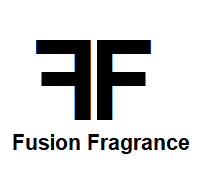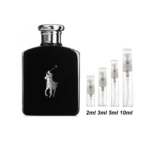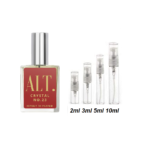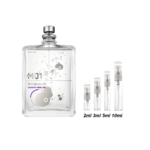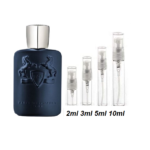In his well written piece on cloned fragrances, Gilbert Henry (gilbert-henry.com) answers (and asks) some important questions, in an attempt to give us a better understanding on this new fragrance landscape we’re in. We find the topic of interest because one of our brands, ALT Fragrances, has built a business around the concept. Their most popular and best selling fragrance is executive number 26 which is a Creed Aventus clone. There are a variety of similar clones on the market but executive 26 by Alt fragrances is considered one of the best. We are happy to provide ALT Executive 26 samples in a variety of sizes.
First he poses the question what is a fragrance clone? He goes on to say “Lately I’ve noticed a sharp increase in advertising for fragrance clones. They are easily identified by messages like “Inspired by Creed Aventus”, or “If you like Dior’s Sauvage, then you’ll love {insert clone name here}”. So then…what exactly is a fragrance clone? Put simply, it is a manufacturer’s best attempt to copy a formula originally created by another company or independent perfumer. It is then given a new name, different packaging, and a lower price. Rather than take the difficult path of originality and creativity, clone houses simply piggyback off the success of others and bypass the difficult work of developing an original creation. Regardless of whether they are cloning the product of an independent niche perfumer or a major design house, it’s an unethical business model.”
All of our fragrance samples are 100% authentic, except where we feature “impression fragrances” which is another name for a clone or a dupe. This would be the case case with alt fragrances and the Executive 26 we mentioned, as well as the ALT Crystal 23 sample that we offer. Another brand of this nature is ARMAF, noted for the superb quality of their dupe fragrances (clones). Their most popular fragrance, coincidentally, happens also to be a Creed Aventus clone. Its called Club de Nuit Intense Man. It’s a long lasting masculine. Like the ALT fragrance we carry Club de Nuit Intense Man samples in a variety of sizes.
Getting back on track, the key question: are dupes or cloned fragrances even legal? He explains “Yes, fragrance dupes/clones are legal. The primary reason that fragrance clones are legal is that a smell cannot be patented. Only the brand name, perfume name, description, and packaging can be protected by law. Perfume companies could patent products, but in order to do so they would have to disclose their formulas. Their trade secrets would then become public information, thus ensuring that near exact duplicates would be made. As long as copycats altered formulas enough to avoid litigation yet retain the integrity of the original fragrance, the original manufacturer would have no way to stop them.”
Next we’re asked is anyone really cares about the clone industry “If customers are getting essentially the same fragrance for a lower price, that’s a good thing, right? Isn’t that the free market at work? I believe it is neither, because the process of creating a clone begins with the appropriation of intellectual property which is even regarded as a “trade secret” by the FDA. This is why perfume manufacturers are not required to list all ingredients on their packaging. Then how are clones made? It begins with the chemical analysis of an original formula through a process called “gas chromatography–mass spectrometry” (GC/MS). This analysis separates and quantifies the aromatic molecules in a fragrance composition. The resulting output is accurate enough to create very convincing counterfeits. And that, in my opinion, is where the issue lies. Let’s say, for the sake of discussion, that someone were to legally access to the formula vault at Firmenich (the world’s largest privately held fragrance manufacturer). If that person were then to steal or even duplicate Firmenich’s formulas, that would certainly be considered theft of trade secrets and result in prosecution. In fact, here’s an example of such an occurrence.”
In conclusion Henry asserts “… while fragrance clones are legal, I consider the business model of fragrance clone “houses” to be unethical. It is based entirely on reverse engineering the work of others, and riding on the coattails of the original creators. So…what can be done about it? To start, consumers who agree with the sentiment of this post should buy original perfumes rather than fragrance clones. Anything beyond that is a matter for experts in the law (which I am not) to debate. However, there is an interesting article here that advocates for copyright protection of perfumes. “
